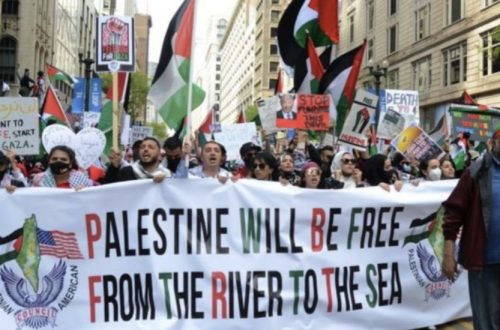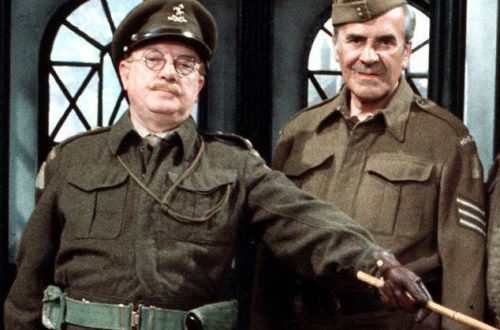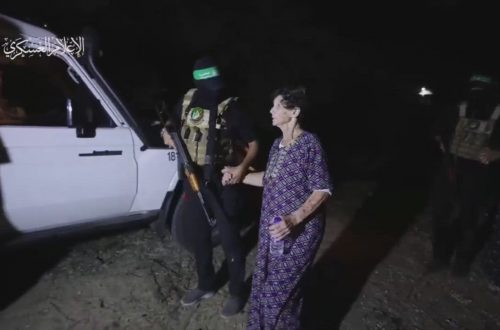Juliano Mer-Khamis was a Jewish theatre director, with a Christian Palestinian father, who ran a theatre in Jenin. He stars in the recent film “Miral“: directed by the Jewish-American director, Julian Schnabel, and based on a novel by his Palestinian girlfriend.
He was an opponent of the existence of Israel:
“Armed struggle is legitimate as long as it’s against an occupier and is done on occupied land,” he said in a 2009 press conference at his theater.
“But if there isn’t history, culture and art behind one’s rifle, that rifle kills rather than liberates.”
“I’m in favor of a single Palestinian state from the river to the sea,” he said at the same press conference. “If the Jews want to live with us, ahlan wasahlan (welcome).”
Despite his Palestinian nationalist politics, and his personal relationships with terrorists, Mer-Khamis and his theatre were the subject of repeated attacks and threats:
One of the theater’s cofounders was Zakariya Zubeidi, Jenin chief of the Aksa Martyrs Brigades described in a 2006 Sunday Times profile as “chief strategist of suicide bombers in the camp Israelis refer to as ‘the capital of suicide terrorism.’” In 2007 Zubeidi renounced terrorism and said he had committed himself to “cultural resistance” through theater.
The appointment of Zubedi turned out to be ineffective in preventing attacks on the Freedom Theatre:
Zubeidi was appointed co-theater director in an attempt to subdue the ongoing threats voiced against both the institution and Mer-Khamis. The theater itself was torched twice in the past, and the threats persisted despite Zubeidei’s appointment.
Some of the criticism focused on the fact that the theater offered co-ed activities, despite prohibition in the Islamic moral code.
Objectors were also outraged when Mer-Khamis staged the play “Animal Farm”, in which the young actors played the part of a pig, which Islam considers an impure animal.
Mer Khamis said he had planned to stage The Lieutenant of Inishmore, a satire of armed resistance, but shelved the idea after someone smashed the window of his car.
This was Mer-Khamis’ response to the attacks on his theatre:
The venue was firebombed three years later, after leaflets were distributed in the refugee camp describing Mer- Khamis as a “fifth column” and calling for his death.
In a 2009 Reuters interview, Mer-Khamis attributed the opposition to a “ghetto mentality”” and “dictatorship of tradition” built up under Israeli occupation.
No individuals or groups have taken responsibility for Mr Mer-Khamis’ murder. The Guardian notes that “his bringing together of young men and women angered conservative Muslim elements in Jenin”. The article continues:
Alaa Eddin Saadi lives next to the theatre, and said that Mer Khamis was shot while in a car also carrying his one-year old son and his nanny, who was wounded in the hand. “I don’t think he was killed because he was Jewish. Some people were angry with the liberal values he was promoting at the theatre, but to me he was a very nice guy who worked hard for the people here.”
Here’s an article in Haaretz by Ari Shavit, worth reading in full:
It is not hard to imagine what would have happened had Juliano Mer-Khamis been murdered by Jews. The murder would receive a huge headline in Haaretz. Under the headline, five furious analyses would appear – one of them mine.
The writers would harshly denounce the Jewish murderousness and urge a culture war against Jewish fanaticism. Others would demand not to repeat the mistake made after Baruch Goldstein’s murderous rampage and to evacuate the settlements immediately. Others would demand to look into the goings on in the Hesder yeshivas, which offer Torah studies alongside military service, and the state-run religious education system.
Selected racist quotes would be pulled out of primitive rabbis’ writings, historic comparisons would be made to Emil Gruenzweig’s murder and Yitzhak Rabin’s murder and Martin Luther King’s murder.
Within a day Mer-Khamis would become an icon. On Saturday night thousands would gather holding torches to mourn the peace hero and rise up against the powers of darkness. Mer-Khamis’ murder at the hands of Jews would rebuild the left, reunite it and send it to a new battle against murderous Jewish fascism.
But Juliano Mer-Khamis was not murdered by Jews. So instead of a huge headline he got a story below the fold. Instead of five angry essays, he received only one (beautiful ) eulogy.
Nobody talked about racism, fanaticism and fascism. Nobody spoke of education systems spreading hatred and about primitive clergy. Mer-Khamis did not become an icon and thousands of people did not demonstrate.
Mer’s murder raised neither protest nor outrage nor holy rage. The Israeli left, which knows exactly what to do with a murder by Jews, does not know what to do with murder by Palestinians.
The murder of a peace hero by Palestinians has no place on the left’s emotional and ideological map. The murder of a freedom hero by Palestinians is a dogma-undermining, paradigm-subverting event for the left. Mer-Khamis’ murder by Palestinians is a murder doomed for repression.
This is a deep, broad issue that goes beyond just the Israeli left. One of the outstanding characteristics of Western enlightenment in the 21st century is its inability to denounce forces of evil in the Arab-Muslim world. Western enlightenment likes to criticize the West. It especially likes to criticize the West’s allies in the East. But when it runs into evil originating in the East, it falls silent.
It does not know how to deal with it. It is easy to come out against pro-Western Hosni Mubarak, but hard to come out against the Muslim Brotherhood. It is easy to come out against Prime Minister Benjamin Netanyahu, but hard to come out against Bashar Assad. The enlightened West is incapable of fighting Iran’s Ahmadinejad as it fought against America’s Bushes, South Africa’s Botha or Serbia’s Milosevic.
The result is a long line of distortions. The blood of the Marmara flotilla fatalities is thicker than the blood of those who were murdered and hung in Iran. The blood of the people killed in Gaza is thicker than the blood of those killed in Damascus and Dara’a.
According to Rebecca Tucker, writing in the National Post:
The actor was apparently the target of death threats for his opposition to military occupation on the West Bank.
However, the man arrested for his murder is apparently connected to Palestinian terrorist politics:
Police in Jenin have charged a former Al-Aqsa Brigades militant with the murder of an Israeli-Palestinian theatre director, security sources said on Wednesday.
Palestinian police arrested Mujahed Qaniri on Monday, just hours after a masked gunman shot dead Juliano Mer-Khamis, director of The Freedom Theatre in the refugee camp in this northern West Bank city.
Mer-Khamis, a well-known actor and director who was born of Jewish and Arab parents, was gunned down as he was driving home, with his infant son sat on his knee and the baby-sitter also in the car.
Police sources told AFP that Qaniri, a camp resident who is in his 30s, had been charged with the murder after being identified in three separate line-ups by the baby-sitter, who was sitting in the car when he opened fire.
Friends and associates of Mer-Khamis said the woman, known only as Raida, had seen the killer’s face before he opened fire, after which he donned a mask and fled.
The source said Qaniri once belonged to the Al-Aqsa Martyrs Brigades, an armed offshoot of Palestinian president Mahmud Abbas’s Fatah movement, and had spent at least five years in an Israeli jail.
Some sources said he had since joined Hamas, while others described him as “independent” who had spent five years in a Palestinian jail for supplying weapons to militants from the Islamist group.


